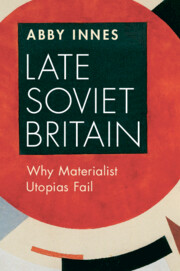Book contents
- Late Soviet Britain
- Late Soviet Britain
- Copyright page
- Epigraph
- Contents
- Figures
- Acknowledgements
- Introduction
- Part I The Materialist Utopias
- Part II Britain’s Neoliberal Revolution
- 5 The New Public Management, or Enterprise Planning in Capitalist Form
- 6 Quasi-markets in Welfare, or the Non-withering State
- 7 Tax Competition, or the Return of Regulatory Bargaining
- 8 Efficient Markets and Climate Change, or Soviet Cybernetics 2.0
- Part III The Rise and Fall of the Neoliberal ‘Movement Regime’
- Index
7 - Tax Competition, or the Return of Regulatory Bargaining
from Part II - Britain’s Neoliberal Revolution
Published online by Cambridge University Press: 14 September 2023
- Late Soviet Britain
- Late Soviet Britain
- Copyright page
- Epigraph
- Contents
- Figures
- Acknowledgements
- Introduction
- Part I The Materialist Utopias
- Part II Britain’s Neoliberal Revolution
- 5 The New Public Management, or Enterprise Planning in Capitalist Form
- 6 Quasi-markets in Welfare, or the Non-withering State
- 7 Tax Competition, or the Return of Regulatory Bargaining
- 8 Efficient Markets and Climate Change, or Soviet Cybernetics 2.0
- Part III The Rise and Fall of the Neoliberal ‘Movement Regime’
- Index
Summary
Neoliberals argue that when economies compete to lower corporate tax rates and regulation, business investment will rise as the state’s ‘distortions’ of the market are withdrawn. Tax competition was also joined to the principle that firms should focus on the maximisation of shareholder value, in preference to any deeper social role. Innes examines the highly value-laden nature of tax models and explains how they replicate the Soviet planning assumption that enterprises are dependably productive economic actors. In the empirical section Innes shows how this policy combination in the UK has produced negative developmental outcomes across the board: for the nature of the large business corporation, for wider economic performance, for the fiscal authority of the state, and for public faith in the integrity of the political class. The theoretical dependence on a closed system ontology of the economy condemns neoclassical tax modelling to edit out the real terrain of corporate incentives and behaviour. As in the Soviet system it also endows firms with excessive political leverage in relation to the state, for example, through the significant corporate capture of tax strategy in HMRC.
- Type
- Chapter
- Information
- Late Soviet BritainWhy Materialist Utopias Fail, pp. 221 - 271Publisher: Cambridge University PressPrint publication year: 2023



